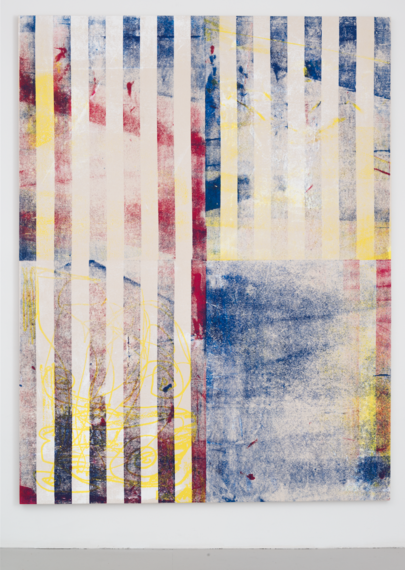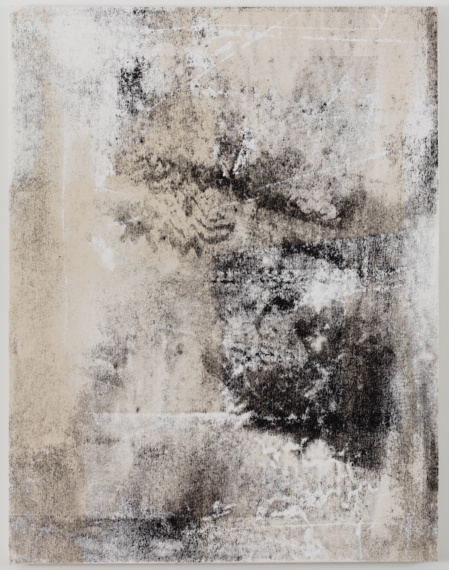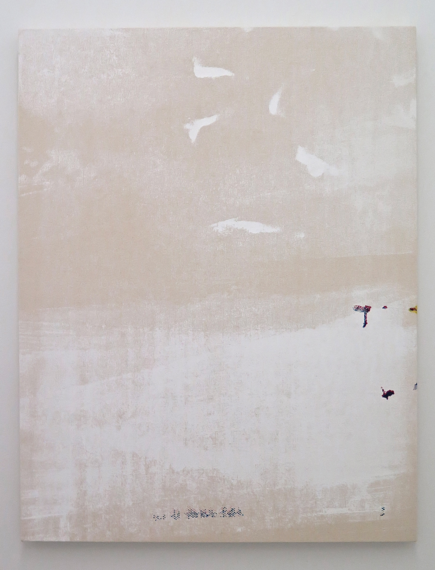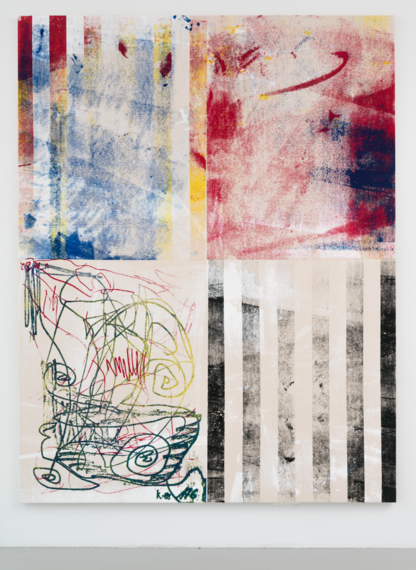Israel Lund, Untitled, 2014. Acrylic on raw canvas. Courtesy of the artist and David Lewis Gallery.
Though his first one-person show was just last year (at Roberts & Tilton in Los Angeles), Brooklyn-based painter Israel Lund (b. 1980) has quickly become known for his canvases featuring stripes and abstract shadows/grazings of paint in both black and white and the CMYK color model.
In advance of his one-person exhibition this winter at the Power Station in Dallas, I visited Lund's Bushwick studio to learn more about his work and process.
In short, he's worth paying attention to. If you have a chance to get to Dallas for his show, go.
For one, Lund's process is fascinating, a unique combination of digital and analogue techniques taken from the history of technologies available to painting (and conceptual art and photography) since Robert Rauschenberg and Andy Warhol. For example, Lund appropriates (from artists such as Daniel Buren -- the stripes, and Martin Kippenberger -- the doodles). He uses photocopies, photographs, and scanned PDFs created with his phone. Via black and white and CMYK paint pushed through silkscreens he nuances the gestures, pressures and forms of abstract painting. Finally, his method is iterative, and he employs chance and challenges finish. He seems never to be finished; he makes a lot of work/experiments everyday; then he meditates on the few which go out into the world.
You could call Lund's relationship with finish "punk." He approaches but then seems to balk at the too-easy, too-beautiful, too-designed. He is more interested in setting up boundaries and the off-register, as a way to challenge himself in further days/weeks/months.
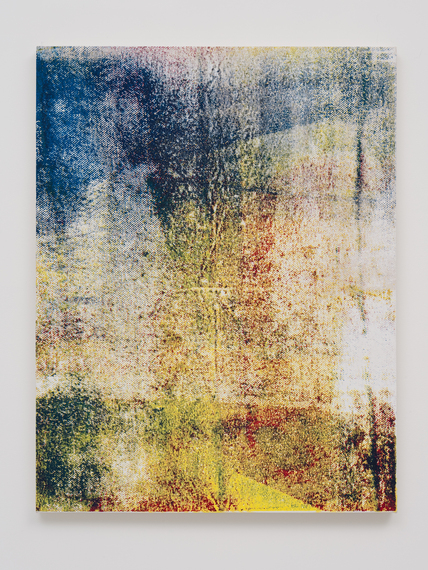
Israel Lund, Untitled, 2013. Acrylic on raw canvas. Courtesy of the artist and Roberts & Tilton, Culver City, California.
Lund's paintings demand in-person consideration. They are objects with 180 degrees of presence. Upon closer looking and walking around them, colors, forms and figurative associations emerge and recede. Personally, with his striped works I found myself seeing bodies between the stripes, as one might see prisoners sleeping behind bars in jail. In some of the works where the stripes are horizontal, they recall flags, and clouds of paint bring to mind antiwar imagery: specifically, how explosions or war photography were juxtaposed with the American flag in the 1960s. I also was intrigued by the subtleties of paint droplets in all of his works; how they sat delicately on top of the canvas grain and had a sculptural presence. Or how the whites and yellows of his paintings powerfully (but almost invisibly) influence our perception.
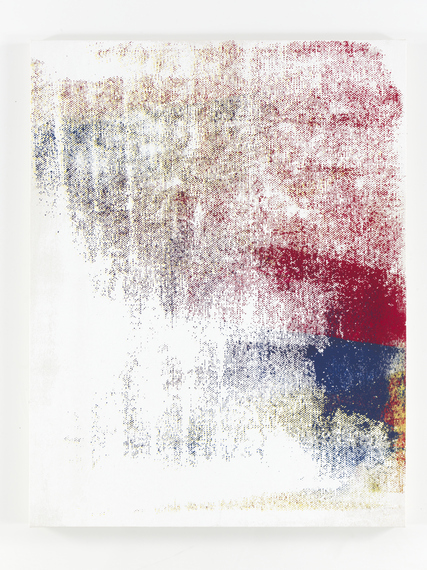
Israel Lund, Untitled, 2013. Acrylic on raw canvas. Courtesy of the artist and Roberts & Tilton, Culver City, California.
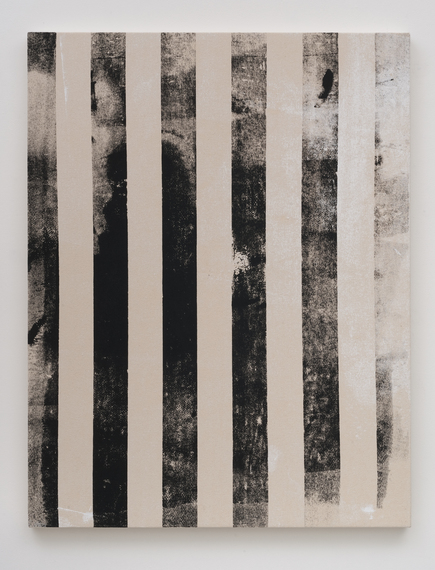
Israel Lund, Untitled, 2013. Acrylic on raw canvas. Courtesy of the artist and Roberts & Tilton, Culver City, California.
What's not well-known is that the installation of Lund's paintings plays an active role in the work. For example, in his 2013 show at Eleven Rivington in New York Lund purposefully installed his paintings with their backs against the window so that light would activate their surfaces and change their appearances throughout the day. In Brussels at Elaine Levy Project, Lund's striped works were hung in direct dialogue with a columned gallery space. The act of looking became, as a result, constantly interrupted by the columns, and the columns' interruptions were, in turn, reflected in Lund's striped paintings.
***
If you saw Lund on the street, you'd think "skateboarder." When I visited him at his studio he was wearing a Thrasher sweatshirt and skate shoes. Skateboarding was Lund's first obsession, which led him to move out to Portland, Oregon (from Vermont) at the age of 18. Soon after Lund began obsessing about art. For a long time he was just gathering images that would influence him. Initially this became a collection of pictures he would aggregate in a scrapbook, and eventually it became his Tumblr, where since 2008 he has kept a running log of his own work and the works of others (such as John Cage, Marcel Duchamp, or his friends) as well as anything else that is inspiring to him (quotes from books, movie stills). His Tumblr is also where his work initially gained a following.
Many associations come to mind when you look at Lund's works. Jasper Johns (due to Lund's stripes that approach flags); Pop Art (due to Lund's use of the silkscreen process); or 1960s and 1970s conceptual artists like the BMPT group and particularly Daniel Buren (due to Lund's appropriation of Buren's work as well as his process that challenges ideas of authorship). Then there is Martin Kippenberger (because, as mentioned before, Lund sampled his doodles), Gerhard Richter (due to the immediate similarity of appearance, though Richter doesn't silkscreen), and Andy Warhol (his shadow paintings in particular). In conversation, Lund referred to the influence of music on his art. (Right now he is interested in Harsh Noise.) Additionally he mentioned the importance of Ray Johnson, On Kawara and Thomas Pynchon to him. Johnson and Kawara are interesting comparisons; one can see similarities between their repetitive processes imbued with subtle differences to Lund's own.
Again, Lund only allows a small number of his works into the world. Don't rely on reproductions or hearsay to tell their story. Go see them.
Israel Lund's next exhibition will open at The Power Station in Dallas, Texas this winter.
